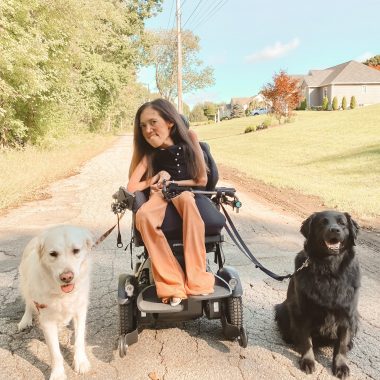Should I Get a Puppy? That’s a Tough Question to Answer
Puppies are a lot of work, but for this columnist, the effort's worth it
Written by |

The best advice I could ever give someone is simple: Get more dogs. I guess if cats are more your thing, that’s OK, too. What’s important is that no matter the animal, they bring you joy.
After all, that’s what pets are — endless amounts of joy and unconditional love. They don’t judge you. They don’t hold grudges. They’re just a constant source of companionship when you need a friend most.
I’ve had dogs my entire life. As a kid, I had a West Highland white terrier named Lucky. God rest her soul, but she wasn’t very lucky. When I turned 11, I got my first golden retriever, named Fred.
Fred was my service dog and best friend. He was so intuitive and highly trained. He understood I was different and cared for me as if I were his pup. He followed me everywhere. He protected me.
At night, I would experience bouts of sleep apnea during which my oxygen would decrease. I would be in such a deep sleep that I wouldn’t hear my oximeter beeping to alert me of what was happening. So Fred would take it upon himself to jump onto my bed and lick me until I woke up.
He was the love of my life and a great addition to our family. With his passing, my family and I had to make the decision of whether or not we would get another puppy.

Alyssa takes Vince and Wish for a walk. (Courtesy of Alyssa Silva)
Puppy energy
Getting a puppy is a much different ballgame than getting a highly trained service dog. Fred had transitioned into our lives so seamlessly, and we were fortunate that the process didn’t disrupt my care routine. A puppy, however, would be a great commitment.
Anyone who has ever had a puppy knows they’re not just cute and cuddly. That’s what makes the other side of raising a puppy worth it. They require lots of attention, time, patience — and sleepless nights. In other words, they require what SMA demands of me every single day. Adding a puppy to the heavy workload of managing my health and the daily nuances of my disability is no easy feat.
This was something we considered in the decision-making process. Along with needing constant care, I also have doctor appointments and procedures, which means leaving a dog at home for an extended period of time and having to find dog sitters. There’s a financial aspect to consider as well. Dogs are expensive. And so is living with SMA.
Weighing the pros and cons of getting a puppy affected all of us in different ways, so it was important that we collectively arrive at a decision together. Ultimately, we decided to get another golden retriever puppy and name him Vince Charming. The first few months were an adjustment to our lifestyles, and we were short-fused at times. But it was worth it.
As fate would have it, I was accepted into a service dog program a year later, and soon my parents and I became a family of five, with the arrival of a black golden retriever named Wish. Having a dog, or dogs, in our case, isn’t always easy when SMA is part of the equation. But our time with them brings us such great joy that the added work doesn’t actually feel like work.
When I’m feeling overwhelmed and need someone to talk to, I turn to my dogs to vent. When I’m feeling lonely and in need of companionship, I turn to my dogs to feel less alone. When I’m having a bad day — fatigued or in pain — I turn to my dogs for comfort. Somehow they know.
We recently welcomed a third golden retriever into our pack upon learning that Wish has cancer. The same decision-making process was considered as we did with Vince, but this time with the understanding that we’re all a little older and slower these days. My body requires even more care than it did before, which was the biggest factor to consider.
At the end of the day, our love for golden retrievers far outweighs the stress and added burden of raising a puppy while managing life with a disability. So we’re doing it. We’re taking care of three dogs like the lunatic dog lovers that we are. And we are so grateful for the sunshine they bring into our lives.

Alyssa’s new dog, Stella. (Courtesy of Alyssa Silva)
Note: SMA News Today is strictly a news and information website about the disease. It does not provide medical advice, diagnosis, or treatment. This content is not intended to be a substitute for professional medical advice, diagnosis, or treatment. Always seek the advice of your physician or other qualified health provider with any questions you may have regarding a medical condition. Never disregard professional medical advice or delay in seeking it because of something you have read on this website. The opinions expressed in this column are not those of SMA News Today or its parent company, Bionews, and are intended to spark discussion about issues pertaining to spinal muscular atrophy.





Leave a comment
Fill in the required fields to post. Your email address will not be published.